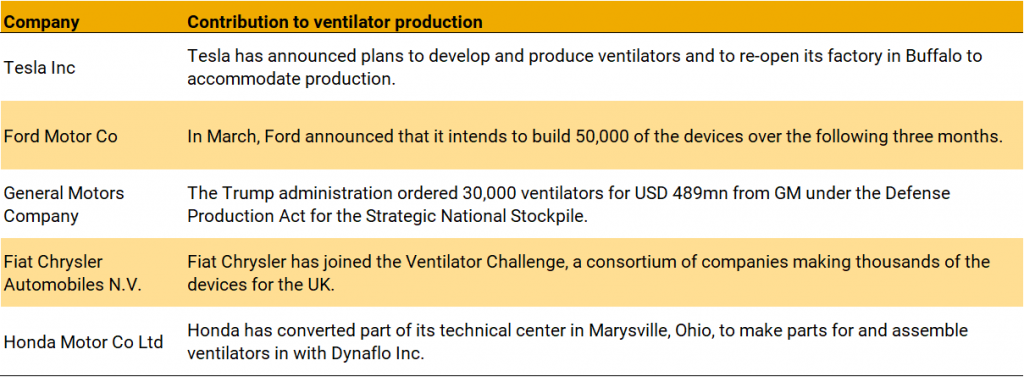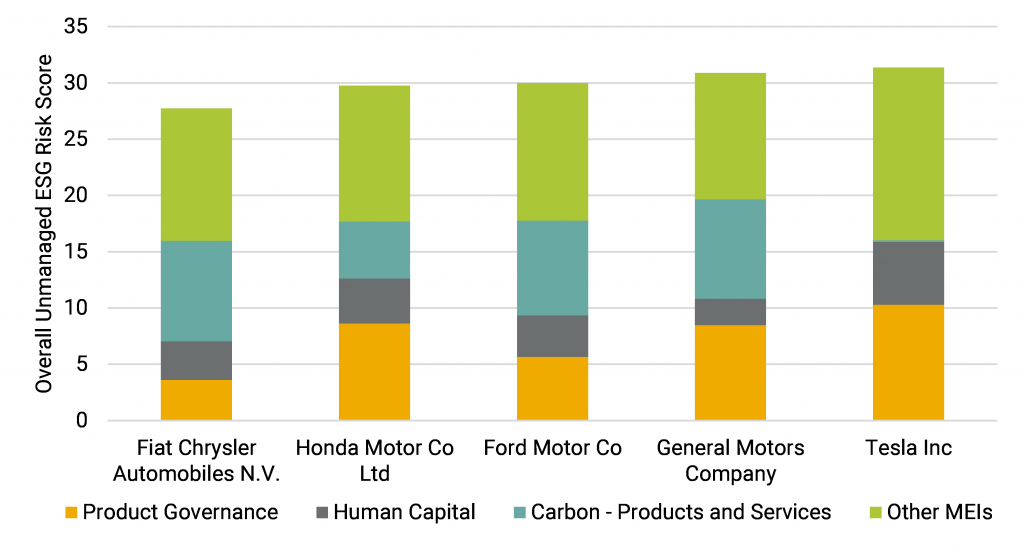Automakers have been hit hard by the COVID-19 pandemic, with widespread plant closures, stalling demand for vehicles and mounting tensions between corporate management teams and government bodies. On the upside, several auto companies have responded to the global health crisis by pivoting parts of their business models to supply the growing demand for ventilators needed for patients suffering from severe respiratory symptoms of COVID-19.
In this post, we assess a sample of global auto companies that are contributing to ventilator production on a set of environmental, social and governance (ESG) criteria that may help investors gauge automakers’ preparedness to diversify their production capacity while also mitigating relevant risks as they resume operations under new market conditions. We consider Human Capital and Product Governance to be among the top Material ESG Issues (MEIs) for investors in this industry to watch moving forward.
The backlash of COVID-19 on the auto industry
The COVID-19 pandemic has taken a heavy toll on the auto industry. In March 2020, global vehicle sales were 39% lower than they were in March 2019.[i] While government-mandated plant closures due to safety concerns and falling demand have driven vehicle production down in March 2020,[ii] most automakers have gradually restarted manufacturing since as early as April 2020.[iii] To stimulate consumer spending, auto companies are offering new, reactionary financing methods. In the US for instance, some incentives include 0% interest rate loans for 84 months.[iv]
Coordination between automakers and state players has been far from optimal during the COVID-19 outbreak. Several big European brands, including Daimler and BMW, have been hoping for state-backed incentives to support car buyers in Germany, but deliberations on this plan have been put on hold.[v] In the US, Tesla has been involved in a controversy with authorities over the reopening of its Fremont plant amidst health concerns.[vi] In the months ahead, these issues, as well as procurement challenges, especially from Asia, will remain key points for investors to monitor.[vii]
Responding to a global health crisis
Hospitals around the world have been overwhelmed by patients suffering severe respiratory symptoms of COVID-19. This problem is particularly acute wherever the demand for the appropriate medical ventilators outstrips supply. To meet the surge in demand, several automakers have announced new plans to work with each other and manufacturers in other industries to produce equipment for healthcare workers and hospital patients. The contributions of these firms range from coordinated ventilator parts manufacturing to machine assembly and delivery. Exhibit 1 highlights five notable examples.
Exhibit 1: Automakers contributing to medical ventilator supply

Source: Sustainalytics[viii]
Investors looking to assess these automakers’ preparedness to shift operational activities on short notice may consider several relevant criteria, such as the overlap between their existing production capabilities and requirements for new products;[ix] their history of fulfilling orders during a state of emergency;[x] their partnerships with other industries (such as medical device producers); and their exposure to relevant ESG issues, including product governance and human capital risks.
As shown in Exhibit 2, Product Governance and Human Capital are two MEIs that contribute substantially (between about 2 and 11 points) to these companies’ overall unmanaged ESG risk scores, which are on the cusp of the high-risk threshold (Unmanaged Risk Score ≥ 30).
While Product Governance and Human Capital are relevant to automakers’ pivoting to ventilator production, we consider Carbon – Products and Services an interesting point of comparison because this MEI is on course to play an increasingly important role for automakers over the long term. A harbinger of increasing carbon risk is a March 2020 letter from major auto lobby groups sent to the EU Commission requesting a delay of their 2021 CO2 targets.[xi]
Source: Sustainalytics
Exhibit 2: Contributions of Product Governance and Human Capital issues to overall ESG Risk Ratings

Source: Sustainalytics
Product Governance
The financial impacts of product governance risks are illustrated by quality and safety concerns and related car recalls that have been on the rise in recent years. As a culmination of this trend, defective Takata airbags have resulted in millions of car recalls for dozens of auto brands between 2016 and 2019.[xii] Contributing to Tesla’s higher risk score on Product Governance is the September 2019 ruling of a California labour judge who found that the firm violated labour laws by threatening employees who were attempting to unionize and had raised concerns about workplace safety.[xiii]
To ensure the safety of their ventilators, automakers may need to readapt their quality management systems (QMS) for these new products. Should lucrative production extend over a longer timeframe, they may be prompted to seek relevant certifications for their QMSs.
Human Capital
Human Capital is another MEI for auto investors to consider because human resource management and workplace safety are critical for operating during a pandemic. In the US, approval and support of carmakers’ safety measures by the United Auto Workers (UAW), the largest union in the US auto-industry, was necessary prior to reopening plants for GM, Ford and FCA.[xiv] Prior to reopening, automakers asked the UAW for volunteers to produce the first wave of ventilators.[xv] These dynamics highlight the importance of maintaining excellent labour relations with unions to ensure smooth operations and the gradual reopening of plants to full capacity. Relations between GM and the UAW have been particularly tense in Q3 and Q4 2019 as the union organised a nation-wide strike of 40 days to protest the closure of three sites. The strike cost GM an estimated USD 4bn and ended with a four-year deal with UAW.[xvi]
Conclusion – MEIs for auto industry investors to watch
Since governments are still stocking ventilators and car sales are still down, automakers may be presented with an opportunity to alleviate some of the financial impacts of the pandemic and reap reputational benefits from participating in the collective effort to fight it. However, to ensure safety in the use phase, quality management systems may have to be strengthened and readjusted. Furthermore, proficient management of labour relations and coordination with unions will continue to be critical for keeping assembly lines running smoothly, and to ensure workforce compliance with sanitary regulations over the next stages of re-opening.
Sources:
[i] https://www.jato.com/global-vehicle-sales-fall-by-39-in-march-while-industry-looks-for-the-path-to-recovery/https://www.theguardian.com/business/2019/oct/25/uaw-united-auto-workers-general-motors-strike-deal
https://www.cnbc.com/2019/10/29/uaw-strike-cost-gm-about-3point8-billion-for-2019-substantially-higher-than-estimated.html
[ii] https://iclg.com/briefing/11745-impacts-to-automotive-supply-chains-from-covid-19
[iii] https://www.cnet.com/roadshow/news/automaker-reopening-restart-coronavirus-plants-return-to-work/
[iv] https://www.edmunds.com/car-news/coronavirus-zero-interest-car-loans-and-deals.html
https://www.thedrive.com/news/33256/over-a-quarter-of-buyers-got-0-finance-deals-on-new-cars-last-month
[v] https://www.dw.com/en/merkel-car-industry-heads-hold-coronavirus-video-conference/a-53334593
[vi] https://www.bbc.com/news/technology-52627744
[vii] https://www.ft.com/content/9d3b2243-5e26-4890-918f-ec1daee33ffb
[viii] https://www.popularmechanics.com/technology/design/a32051532/covid-19-ventilators-tesla-car-parts/ ; https://mashable.com/article/tesla-new-york-reopen-ventilators/npr.org/sections/coronavirus-live-updates/2020/04/16/836148398/ford-says-its-on-track-to-begin-making-ventilators-next-week; https://www.hhs.gov/about/news/2020/04/08/hhs-announces-ventilator-contract-with-gm-under-defense-production-act.html; https://www.msn.com/en-us/news/us/ford-and-gm-are-undertaking-a-warlike-effort-to-produce-ventilators-it-may-fall-short-and-come-too-late/ar-BB12acKh; https://www.bloomberg.com/news/articles/2020-04-08/most-u-k-made-ventilators-won-t-arrive-in-time-for-virus-peak; https://www.forbes.com/sites/greggardner/2020/04/30/honda-teams-up-with-dynaflo-to-boost-ventilator-production/#45f2ace340b8.
[ix] https://www.popularmechanics.com/technology/design/a32051532/covid-19-ventilators-tesla-car-parts/; https://mashable.com/article/tesla-new-york-reopen-ventilators/
[x] https://voxeu.org/article/ramping-ventilator-production-lessons-wwii
[xi] https://www.acea.be/uploads/news_documents/COVID19_auto_sector_letter_Von_der_Leyen.pd
Recent Content
Six Best Practices Followed by Industries Leading the Low Carbon Transition
In this article, we take a closer look at the leading industries under the Morningstar Sustainalytics Low Carbon Transition Rating (LCTR) and examine the best practices that have allowed them to emerge as leaders in managing their climate risk.
Navigating the EU Regulation on Deforestation-Free Products: 5 Key EUDR Questions Answered About Company Readiness and Investor Risk
The EUDR comes into effect in December 2024, marking an important step in tackling deforestation. In this article, we answer five key questions who the EUDR applies to, how companies are meeting the requirements, and the risks non-compliance poses to both companies and investors
Child Labor in Cocoa Supply Chains: Unveiling the Layers of Human Rights Challenges
Child labor remains a persistent issue in the cocoa supply chain. So can major food brands do to stop it? Discover the steps companies can take to address the issue and ways investors can engage with companies to mitigate it.




-5-key-questions-answered-about-company-readiness-and-investor-risk.tmb-thumbnl_rc.jpg?Culture=en&sfvrsn=ee2857a6_2)
